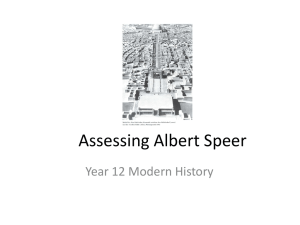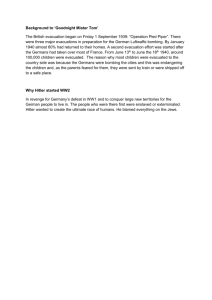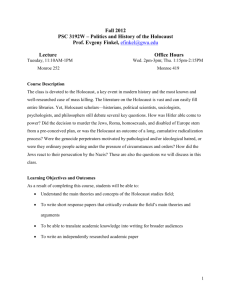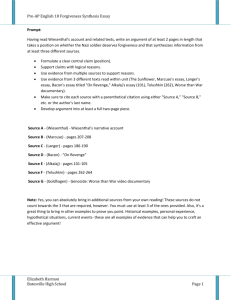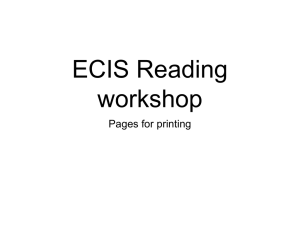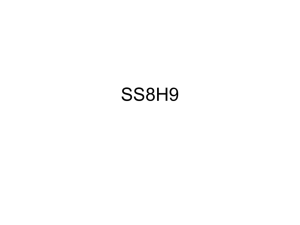(Proposal15Lockett) right
advertisement
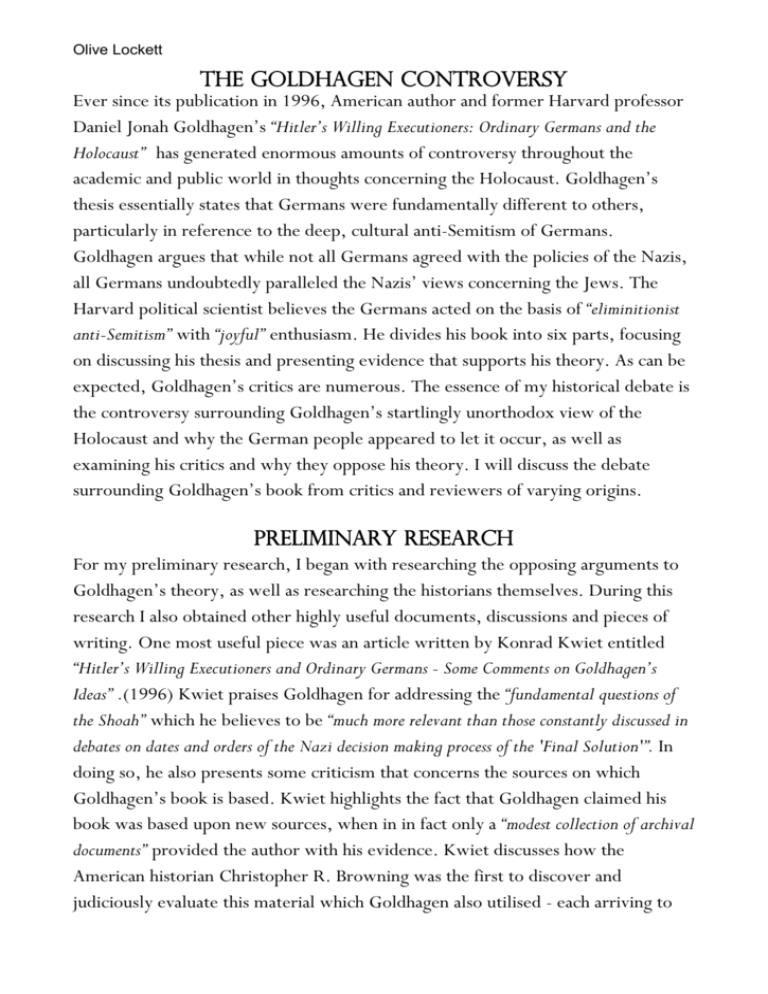
Olive Lockett THE GOLDHAGEN CONTROVERSY Ever since its publication in 1996, American author and former Harvard professor Daniel Jonah Goldhagen’s “Hitler’s Willing Executioners: Ordinary Germans and the Holocaust” has generated enormous amounts of controversy throughout the academic and public world in thoughts concerning the Holocaust. Goldhagen’s thesis essentially states that Germans were fundamentally different to others, particularly in reference to the deep, cultural anti-Semitism of Germans. Goldhagen argues that while not all Germans agreed with the policies of the Nazis, all Germans undoubtedly paralleled the Nazis’ views concerning the Jews. The Harvard political scientist believes the Germans acted on the basis of “eliminitionist anti-Semitism” with “joyful” enthusiasm. He divides his book into six parts, focusing on discussing his thesis and presenting evidence that supports his theory. As can be expected, Goldhagen’s critics are numerous. The essence of my historical debate is the controversy surrounding Goldhagen’s startlingly unorthodox view of the Holocaust and why the German people appeared to let it occur, as well as examining his critics and why they oppose his theory. I will discuss the debate surrounding Goldhagen’s book from critics and reviewers of varying origins. PRELIMINARY RESEARCH For my preliminary research, I began with researching the opposing arguments to Goldhagen’s theory, as well as researching the historians themselves. During this research I also obtained other highly useful documents, discussions and pieces of writing. One most useful piece was an article written by Konrad Kwiet entitled “Hitler’s Willing Executioners and Ordinary Germans - Some Comments on Goldhagen’s Ideas” .(1996) Kwiet praises Goldhagen for addressing the “fundamental questions of the Shoah” which he believes to be “much more relevant than those constantly discussed in debates on dates and orders of the Nazi decision making process of the 'Final Solution'”. In doing so, he also presents some criticism that concerns the sources on which Goldhagen’s book is based. Kwiet highlights the fact that Goldhagen claimed his book was based upon new sources, when in in fact only a “modest collection of archival documents” provided the author with his evidence. Kwiet discusses how the American historian Christopher R. Browning was the first to discover and judiciously evaluate this material which Goldhagen also utilised - each arriving to Olive Lockett differing conclusions. He argues that Goldhagen’s dissertation was intentionally “anti-Browning”, aiming to present his book as the modern and definitive work on the Shoah. Kwiet also accuses Goldhagen of presenting his findings as new, arguing that similar ideas were in fact presented half a century earlier. In this article, Goldhagen is also accused of rejecting and criticising “any material which does not fit into his model of description and interpretation” as indicated by his methodological approach. Kwiet presents his own view, essentially discussing his belief that the “process by which ‘ordinary Germans’ came to commit murder was… more complicated.” As part of this research, I also found another interesting document. This document entitled “A Nation on Trial” contains two articles, the first of which is written by Norman G. Finkelstein, entitled “Daniel Jonah Goldhagen’s ‘Crazy’ Thesis: A Critique of Hitler’s Willing Executioners” (1997) Finkelstein writes a particularly scathing review of Goldhagen’s book, arguing that it is “not at all a learned enquiry”, stating that it is “worthless as scholarship”. Reflecting Kwiet’s argument, Finkelstein also points out the fact that Goldhagen’s thesis and findings are not altogether new. Ultimately, Finkelstein picks apart and criticises multiple elements of Goldhagen’s book within his lengthy review. The second article in this document is entitled “Historiographical Review: Revising The Holocaust” (1997) as written by Ruth Bettina Birn - the Chief Historian of War Crimes and Crimes Against Humanity Section in the Department of Justice, Canada. Birn presents a mild criticism of Goldhagen’s work, stating that “His assertion that German anti-Semitism was unique can only be made by comparing it to other forms of anti-Semitism… It is odd that a professor of political science makes no attempt to look at his evidence in a comparative framework.” She too points out that historical documents have only been utilised by Goldhagen to a “minimal extent”. She also accuses him of a small evidentiary base, which Kwiet focused upon within his review. In her review, Birn also mentions to contrast between Browning and Goldhagen’s conclusions - pointing out that the members of Police Battalion 101 (which forms the third part of Goldhagen’s book) in fact gave explanations for their behaviour. This formed the core for Browning’s study. Birn appears to praise Browning for discussing a wide range of explanations for the varying behaviours of the “executioners”, rather than Goldhagen’s narrow explanation of deep anti-Semitism. Birn essentially dismisses Goldhagen’s work as a product of a “professional American marketing strategy”. In her conclusion, she defends her lengthy Olive Lockett review of a book which she deems as worthless to academia by stating “When the historical agenda can be dictated by advertising and marketing, professional historians must respond.” Evidently, there is a recurring pattern among the criticisms of Goldhagen’s book. This pattern appears to include an accusation of limited sources, of his findings being unoriginal and of his theory being merely a product for the media and general public as formulated by advertising. In light of this preliminary research, I have formulated enquiry questions which will be the basis of my project: • • What were the events up to 1945 that gave rise to Hitler’s Willing Executioners? In answering this question, I will be discussing the events surrounding the Nazi Government which led to the Holocaust. I will also discuss the evidence of antiSemitic feelings within Germany prior to 1939. I will then be speaking about the Holocaust itself, its main elements, why it occurred and how. With this paragraph, I aim to give some background to my area of debate, which essentially surrounds the events of the Holocaust. What is the essence of Goldhagen’s argument? In this paragraph I will be discussing the nature of Goldhagen’s argument and what his main points are, eventually making a personal judgement upon these. To answer this question I will also be looking at the author’s context and his motives in writing such a piece. I will also be explaining and exploring the sources which Goldhagen used as evidence for his controversial theory. Ultimately, I will be thoroughly examining Goldhagen’s “Hitler’s Willing Executioners” and making a • judgement upon the credibility of his arguments. What was the nature of the criticism in the wake of the publication? To answer this question I will be discussing the reactions of historians and critics, mostly during the years of 1996 and 1997. I will be examining the documents of Christopher R. Browning most closely, as he utilised the same documents as Goldhagen for his book “Ordinary Men”. Browning is also a prominent critic of Olive Lockett Goldhagen’s theory. I will also be examining the arguments of Konrad Kwiet who presented a paper at the book launch of Goldhagen’s “Hitler’s Willing Executioners” staged at the U.S Holocaust Memorial Museum in 1996. • Almost 20 years on from the publication of “Hitler’s Willing Executioner’s”, how has the debate evolved? I am yet to find a sufficient amount of effective sources in order to answer this question though I know that my focus will be upon historians and critics who have written upon the Goldhagen Controversy within the last five years or so. I will be comparing and contrasting between the opinions of 1996 and the present. FUTURE RESEARCH In order to complete my project, I must endeavour to research the historians who agree with Goldhagen’s theory as well as general articles and discussions which will aid in my judgment. I must also find the critiques, reviews and reactions, both from the time of publication and from the present, of the German community and the Jewish community. I have recently found Daniel Jonah Goldhagen’s email address and plan on establishing a correspondence with him. I wish to enquire about his feelings and reaction to his critics, therefore gaining a unique and personal insight into Goldhagen and this controversy. I have also borrowed “Hitler’s Willing Executioners” from the local library and have begun reading, which will most certainly aid in my understanding of the debate. In regards to my first enquiry question, I must also thoroughly research the Holocaust itself, I will endeavour to find effective digital and written resources which will help me in constructing this paragraph for my project. . In understanding the events of the Holocaust I will research the works of the prominent Holocaust historian and scholar, Yehuda Bauer - a respected authority on the subjects of the Holocaust. I have achieved some enlightenment upon my third enquiry question with my preliminary research, though I plan to broaden Olive Lockett my knowledge by researching the reactions of the German and Jewish community. In particular, I plan to research the views of the Jewish Israeli historian, Moshe Zimmerman. Zimmerman is from a Jewish family who fled Hamburg and Nazi Germany in 1935. I will also be using John Rohl’s writing concerning the Goldhagen controversy as he discusses Goldhagen’s critics and speaks about the reception of his book within Germany - discussing both German praise and German criticism. Rohl ends with suggestions for further reading, which I will most certainly look into. In regards to my fourth enquiry question, I must set about as to research present reactions and reviews of Goldhagen’s book as almost 20 years have passed since its publication and most reviews and discussions were published in 1996/1997. In order to answer this question I will obviously be researching recent sources - within the last five years or so. I am having some trouble obtaining such particular sources, therefore I will most likely be asking for some help in answering this question. In terms of the project itself, I will most certainly be reading past projects from students who have completed their Higher School Certificate. As well as this, I have downloaded and obtained a number of documents, which I intend to study closely. BIBLIOGRAPHY Josef Joffre, 1997. “Hitler’s Willing Executioner’s: An Exchange” http://www.nybooks.com/articles/archives/1997/feb/06/hitlers-willingexecutioners-an-exchange/ • Carl Schulkin, 1996. “Schulkin on Goldhagen, 'Hitler's Willing Executioners: Ordinary Germans and the Holocaust” https://networks.hnet.org/node/14773/reviews/16633/schulkin-goldhagen-hitlers-willingexecutioners-ordinary-germans-and • Alex Tietjen, 2003. “An Examination of: Daniel Jonah Goldhagen’s Hitler’s Willing Executioner’s: Ordinary Germans and the Holocaust (1996)” http://www.history.ucsb.edu/faculty/marcuse/classes/33d/projects/bat101/ TietjenGoldhagenRev.htm • Konrad Kwiet, 1996. “Hitler’s Willing Executioner’s and “Ordinary Germans - Some Comments on Goldhagen’s Ideas” http://web.ceu.hu/jewishstudies/pdf/01_kwiet.pdf • Olive Lockett • Norman G. Finkelstein, 1997. “Daniel Jonah Goldhagen’s ‘Crazy’ Thesis: A Critique of Hitler’s Willing Executioner’s” Published in the New Left Review (London) • Ruth Bettina Birn, 1997. “Historiographical Review: Revising the Holocaust” Published in The Historical Journal (Cambridge University Press) • DAAD, 2013. “Moshe Zimmerman” https://www.daad.de/alumni/netzwerke/vipgalerie/nordafrika/12810.en.html • William Lamont, 1998. “Historical controversies and historians” Published by UCL Press (London) This is a promising Proposal, Olive, with a good deal of useful material but some gaps you will clearly need to fill. The relatively late selection of the Project topic has left you less well read than you would wish to be but you have made some good progress in coming to terms with the issues in contention. It is great to see you naming specific historians and demonstrating at least a working knowledge of the broad outlines of the arguments they present. There is a gap when it comes to the more recent historiography but I'm sure you are capable of doing the research necessary to fill in this gap. The quality of your writing is generally strong though there are some moments where you lapse so check all the adjustments I have made. You want to be able to edit your work in such a way that very few such infelicitous moments creep through into the Project you finally submit. Above all, master the apostrophe. This is taught in Years 7 and 8. It seems you may have been nodding off at the time ... times! It looks ordinary to be consistently making such mistakes ... and you would not wish to appear ordinary. I think the Enquiry Questions you have chosen are fine and should give you the chance to explore the historiography of this issue successfully and come to your own conclusion. I look forward to seeing what you can do with this topic. 8/10
